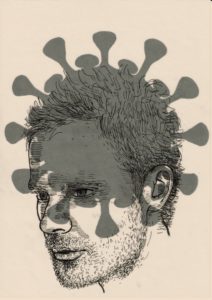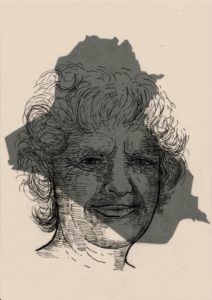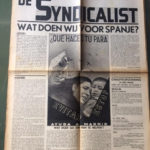Unesco ~ Global Open Access Portal ~ Caribbean Countries ~ English & French Speaking
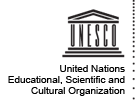 The University of West Indies (UWI) has a leading role in open access initiatives in the region. UWI is a multi campus University, with major campuses situated in Jamaica (Mona), Trinidad & Tobago (St. Augustine) and Barbados (Cave Hill). UWI at Mona offers online open access to full-text scholarly output from UWI within its MORD-Mona Online Research Database and institutional repository registered in OpenDOAR. UWI Libraries and UWI Digital Library Services Centre (DLSC) at the St. Augustine Campus, manage an institutional repository of UWI. UWI is also a member of the Networked Digital Library of Theses and Dissertations (NDLTD).
The University of West Indies (UWI) has a leading role in open access initiatives in the region. UWI is a multi campus University, with major campuses situated in Jamaica (Mona), Trinidad & Tobago (St. Augustine) and Barbados (Cave Hill). UWI at Mona offers online open access to full-text scholarly output from UWI within its MORD-Mona Online Research Database and institutional repository registered in OpenDOAR. UWI Libraries and UWI Digital Library Services Centre (DLSC) at the St. Augustine Campus, manage an institutional repository of UWI. UWI is also a member of the Networked Digital Library of Theses and Dissertations (NDLTD).
In ROAR and in OpenDOAR, are registered the repositories of the University of West Indies, the Public Digital Library e-Jamaica, and MANIOC. No mandates registered in ROARMAP.
In the Caribbean, open access initiatives promote regional collaboration and integration of digital collections, with support from foreign and international agencies for digitization and preservation of patrimonial documents and preserving memories, examples:
The Digital Library of the Caribbean (dLOC), established in 2004, is an open access cooperative, multilingual and multi-institutional digitization project of partners within the Caribbean and circum-Caribbean that provides users with open access to Caribbean cultural, historical and research materials held in archives, libraries, and private collections.
Another example of cross-institutional open access initiative is MANIOC, a scientific and cultural open access repository specializing on the Caribbean, the Amazon, the Guyana Plateau and regions or areas of interest related to these territories.
Several digital libraries from the region offer open access to special collections digitized because of their cultural, historical and research significance for countries in the Caribbean, ex.: National Library and Information System Authority (NALIS) Digital Library of Trinidad and Tobago, Digital Collections at University of West Indies St. Augustine in Trinidad and Tobago, National Library of Jamaica Digital Collections, among other.
For subject open access initiatives, several examples can be mentioned:
On legislation:
CARIBLEX, the International Labor Organization’s database of national labour legislation for the 13 ILO member States of the English- and Dutch-speaking Caribbean is maintained by the ILO’s Subregional Office for the Caribbean.
Carilaw (Caribbean Law Online) coordinated by the Faculty of Law Library, Cave Hill Campus of the University of the West Indies.
Go to: http://www.unesco.org/the-caribbean
Paolo Giordano ~ In tijden van besmetting
‘Als het om besmetting gaat, is gebrek aan solidariteit bovenal een gebrek aan verbeeldingskracht. De gemeenschap in tijden van besmetting is de totaliteit van alle mensen op aarde.’
CoV-2, die de grootste bedreiging vormt van onze tijd, raast door de geglobiseerde wereld. De epidemie dwingt ons onszelf te beschouwen als behorend bij een collectief. In tijden van besmetting zijn we één enkel organisme; we worden weer een gemeenschap. Paolo Giordano is niet bang ziek te worden, maar wel bang dat de beschaving een kaartenhuis blijkt te zijn, dat alles wordt uitgewist. Maar hij is vooral bang dat als de epidemie direct over is, alles uiteindelijk hetzelfde blijft.
Van eind februari tot begin maart schrijft de Italiaanse auteur Paolo Giordano In tijden van besmetting om vooral niet te missen wat deze epidemie over onszelf vertelt. De corona-epidemie, die identiteit en cultuur overstijgt, maakt niet alleen duidelijk op hoeveel niveaus we met elkaar zijn verbonden, maar ook de complexiteit van de wereld waarin we leven. ‘Aan deze besmetting kunnen we afmeten hoezeer onze wereld is geglobaliseerd, verweven is geraakt, een ontwarbare kluwen is geworden.’
Voor de auteur van de bestseller De eenzaamheid van de priemgetallen (2009) en cum laude afgestudeerd in natuurkunde, is wiskunde een onmisbaar instrument om te begrijpen wat er aan de hand is, want wiskunde is de wetenschap van relaties. De besmetting is een infectie van het netwerk van onze onderlinge betrekkingen, aldus Paolo Giordano. De besmetting als kille, wiskundige abstractie is ook een groot spel, een spel van het quarantainedilemma. Paolo Giordano legt uit wat het SIR-model is, het alles onthullende geraamte van elke epidemie. SARS-COV-2 is het virus, COVID-19 de ziekte. Hij onderscheidt drie groepen: de vatbaren (Susceptibles), de besmettelijken (Infectious) en de mensen die niet meer ziek zijn (Recovered), waarbij de vatbaren de belangrijkste is: zevenenhalf miljard personen maken onderdeel uit van deze groep.
De groei van het virus is niet-lineair, niet constant, maar neemt voortdurend sneller toe. Een besmetting begint als kettingreactie, steeds meer personen worden steeds sneller besmet. Hoe snel hangt af van een getal, de verborgen kern van de epidemie, dat wordt aangeduid met het symbool er-nul, elke epidemie heeft haar eigen er-nul, aldus Paolo Giordano. Read more
Noam Chomsky: Ventilator Shortage Exposes The Cruelty Of Neoliberal Capitalism
 COVID-19 has taken the world by storm. Hundreds of thousands are infected (possibly many times more than the confirmed cases), the list of dead is growing exponentially longer, and capitalist economies have come to a standstill, with a global recession now virtually inevitable.
COVID-19 has taken the world by storm. Hundreds of thousands are infected (possibly many times more than the confirmed cases), the list of dead is growing exponentially longer, and capitalist economies have come to a standstill, with a global recession now virtually inevitable.
The pandemic had been predicted long before its appearance, but actions to prepare for such a crisis were barred by the cruel imperatives of an economic order in which “there’s no profit in preventing a future catastrophe,” Noam Chomsky points out in this exclusive interview for Truthout. Chomsky is emeritus professor of linguistics at MIT and laureate professor at the University of Arizona, author of more than 120 books and thousands of articles and essays. In the interview that follows, he discusses how neoliberal capitalism itself is behind the U.S.’s failed response to the pandemic.
C.J. Polychroniou: Noam, the outbreak of the new coronavirus disease has spread to most parts of the world, with the United States now having more infected cases than any other country, including China, where the virus originated. Are these surprising developments?
Noam Chomsky: The scale of the plague is surprising, indeed shocking, but not its appearance. Nor the fact that the U.S. has the worst record in responding to the crisis.
Scientists have been warning of a pandemic for years, insistently so since the SARS epidemic of 2003, also caused by a coronavirus, for which vaccines were developed but did not proceed beyond the pre-clinical level. That was the time to begin to put in place rapid-response systems in preparation for an outbreak and to set aside spare capacity that would be needed. Initiatives could also have been undertaken to develop defenses and modes of treatment for a likely recurrence with a related virus.
But scientific understanding is not enough. There has to be someone to pick up the ball and run with it. That option was barred by the pathology of the contemporary socioeconomic order. Market signals were clear: There’s no profit in preventing a future catastrophe. The government could have stepped in, but that’s barred by reigning doctrine: “Government is the problem,” Reagan told us with his sunny smile, meaning that decision-making has to be handed over even more fully to the business world, which is devoted to private profit and is free from influence by those who might be concerned with the common good. The years that followed injected a dose of neoliberal brutality to the unconstrained capitalist order and the twisted form of markets it constructs.
The depth of the pathology is revealed clearly by one of the most dramatic — and murderous — failures: the lack of ventilators that is one the major bottlenecks in confronting the pandemic. The Department of Health and Human Services foresaw the problem, and contracted with a small firm to produce inexpensive, easy-to-use ventilators. But then capitalist logic intervened. The firm was bought by a major corporation, Covidien, which sidelined the project, and, “In 2014, with no ventilators having been delivered to the government, Covidien executives told officials at the [federal] biomedical research agency that they wanted to get out of the contract, according to three former federal officials. The executives complained that it was not sufficiently profitable for the company.”
Doubtless true.
Hail Freedonia, Land of the Free! De satirische maatschappijkritiek van de Marx Brothers
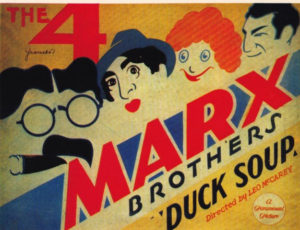 De Amerikaanse Marx Brothers maakten tussen 1929 en 1949 dertien films. Centraal daarin staat de non-conformistische, vaak surrealistische, absurde humor van Groucho, Chico, Harpo en (soms) Zeppo Marx. Het verhaal doet er daarbij niet zoveel toe. De films zijn satirisch, anti-establishment en anti-autoritair. In de jaren zeventig werden hun films door de protestgeneratie van die dagen herontdekt. Niet alle films van de Marx Brothers zijn vandaag de dag nog het aanzien waard. Hoogtepunt in hun œuvre is Duck Soup (1933) – zonder meer de aller leukste antimilitaristische film ooit – een politieke satire die in de jaren dertig gezien werd als kritiek op de totalitaire regiems in Duitsland en Italië en waarvan de boodschap niet aan waarde heeft ingeboet.
De Amerikaanse Marx Brothers maakten tussen 1929 en 1949 dertien films. Centraal daarin staat de non-conformistische, vaak surrealistische, absurde humor van Groucho, Chico, Harpo en (soms) Zeppo Marx. Het verhaal doet er daarbij niet zoveel toe. De films zijn satirisch, anti-establishment en anti-autoritair. In de jaren zeventig werden hun films door de protestgeneratie van die dagen herontdekt. Niet alle films van de Marx Brothers zijn vandaag de dag nog het aanzien waard. Hoogtepunt in hun œuvre is Duck Soup (1933) – zonder meer de aller leukste antimilitaristische film ooit – een politieke satire die in de jaren dertig gezien werd als kritiek op de totalitaire regiems in Duitsland en Italië en waarvan de boodschap niet aan waarde heeft ingeboet.
It’s war!’… It’s war!’… At last!’ – De Marx Brothers in Duck Soup
Vaudeville
Gepokt en gemazeld door jarenlange ervaring in het Amerikaanse vaudevilletheater in de jaren tien en twintig van de vorige eeuw, namen de Marx Brothers in 1929 hun eerste speelfilm op, The Cocoanuts. Al bijna twintig jaar toerden de broers Groucho, Chico, Harpo, en later ook Zeppo, met hun theaterprogramma’s door de VS: hilarische shows met nauwelijks een verhaallijn, vol absurde dialogen en bizarre sketches. Groucho Marx (1890–1977), met licht door de knieën gezakt loopje, geverfde snor en continu sigaar rokend – lijkt daarin voortdurend aan het woord: ad rem, niets en niemand ontziend in zijn commentaren en beledigingen, zowel tegen medespelers als publiek, altijd op zoek naar een winstgevende deal of een rijke weduwe, maar vaak gaat dat samen. Chico Marx (1887-1961) speelt een niet al te snuggere Italiaan, weliswaar een virtuoos pianist, maar veel verder dan het maken van woordgrappen in overbodige dialogen met Groucho komt hij niet. Harpo Marx (1888-1964) is de clown van het gezelschap, een ongeleid projectiel, die iedere situatie uitbuit om een grap uit te halen, blonde vrouwen achterna jaagt, bestek, serviesgoed en wekkers uit zijn jas tevoorschijn haalt, maar wel prachtig harp speelt. Hij zegt nooit een woord en communiceert door middel van een autotoeter en door op zijn vingers te fluiten. Zeppo Marx (1901-1979) is een humorloze straight man met nauwelijks tekst. Na de vierde film van de broers verdween hij geruisloos uit beeld.
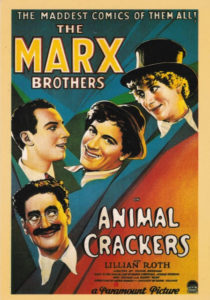 Wanhoop en chaos
Wanhoop en chaos
Hun eerste films, The Cocoanuts (1929) en Animal Crackers (1930) zijn eigenlijk niet meer dan gefilmde registraties van eerder gespeelde theatershows. In The Cocoanuts wordt de draak gestoken met de grondspeculatie in de jaren twintig in Californië, Animal Crackers is een satire op de Amerikaanse high society, die zich verpoost op feestjes, in Horsefeathers (1932) gaat het doen en laten op een Amerikaanse universiteit op de schop. De verhalen werden voor de verfilmingen wat meer gestroomlijnd, maar in essentie bleven het theaterstukken. In Monkey Business (1931) en Duck Soup (1933) is het statische van de toneelversies geheel verdwenen en komen de broers pas echt op dreef. Deze twee films hebben – ook nu nog – een ongelooflijke vaart: snelle montage en rappe dialogen. De volgende scene buitelt als het ware over de vorige heen, grappen volgen elkaar in razendsnel tempo op. Groucho is voortdurend aan het woord en lanceert de ene oneliner na de andere.
Harpo steelt de show met uiterst originele gimmicks en visuele grappen, Chico laveert, Italiaans-Engels babbelend, tussen de scènes door. Een doorwrocht verhaal hebben deze twee films niet, maar dat is ook niet nodig. In Monkey Business zijn de broers verstekelingen op een oceaanstomer, in Duck Soup staat de onenigheid tussen twee dwergstaatjes centraal. Maar juist deze simpele situaties bieden meer dan voldoende ruimte om te talenten van de broers te kunnen etaleren. Daarmee drijven ze anderen tot wanhoop, creëren ze een gezonde chaos en voeren ze de absurditeit ten top. Binnen die situaties ontrolt zich een caleidoscoop van onlogisch opgebouwde sketches, woordspelingen, onzinnige hilarische grappen, beledigingen, achtervolgingen en overbodige dialogen. Autoriteiten worden geïntimideerd, ambtenaren en directeuren, gezagsdragers als politici en agenten, dwars gezeten en voor gek gezet. Ladies in society worden geschoffeerd en beledigd. Bij de slachtoffers ontstaat ontreddering, wanhoop en paniek.
Groucho: ‘A four-year-old child could understand this report! Run out and find me a four-year-old child.’
Read more
Walking Stories
 Lisa, a fragile Indonesian woman, walked along the paths of Saint Anthony’s park. Saint Anthony is a mental hospital. Lisa was dressed in red, yellow and blue; I was looking at a painting of Mondriaan, of which the colours could cheer someone up on a grey Dutch day. She had put on all her clothes and she carried the rest of her belongings in a grey garbagebag. She looked like she was being hunted, mumbling formulas to avert the evil or the devils. I could not understand her words, but she repeated them with the rustling of her garbage bag on the pebbles of the path.
Lisa, a fragile Indonesian woman, walked along the paths of Saint Anthony’s park. Saint Anthony is a mental hospital. Lisa was dressed in red, yellow and blue; I was looking at a painting of Mondriaan, of which the colours could cheer someone up on a grey Dutch day. She had put on all her clothes and she carried the rest of her belongings in a grey garbagebag. She looked like she was being hunted, mumbling formulas to avert the evil or the devils. I could not understand her words, but she repeated them with the rustling of her garbage bag on the pebbles of the path.
When she arrived at an intersection of two paths where low rose hips were blossoming, she stopped and went into the bushes. She lifted all her skirts and urinated; standing as a colourful flower amidst the green of the bushes and staring into the sky. A passer-by from the village where Saint Anthony’s has its headquarters would probably have pretended not to see her, knowing that Lisa was one of the ‘chronic mental patients’ of the wards. Or, urinating so openly in the park may be experienced as a ‘situational improperty’, but as many villagers told me: ‘They do odd things, but they cannot help it.’ The passer-by would not have known that Lisa was a ‘walking story’, that she had ritualised her walks in order to control the powers that lie beyond her control. Lisa was diagnosed with ‘schizophrenia’ and she suffered from delusions. When she had an acute psychosis, she needed medication to relieve her anxiety. Her personal story was considered as a symptom of her illness. That was, in a nutshell, the story of the psychiatrists of the mental hospital. Her own story was different. Lisa was the queen of the Indies and she had to have offspring to ensure that her dynasty would be preserved. She believed at that day that she was pregnant and that the magicians would come and would take away her unborn baby with a needle. To prevent the abortion, she had to take refuge in the park and carry all her belongings with her.
Judit Neurink ~ Geweld is nooit ver weg. Tien jaar berichten uit Irak
Judit Neurink vertrok in 2008 naar Irak om er met Nederlands geld een mediacentrum op te zetten om jonge journalisten te trainen en zo een bijdrage te leveren aan de prille democratie. Ze was er getuige van dat het land uiteenviel op basis van etniciteit en religie en dat de roep om een sterke leider toenam. Ze maakte de wederopbouw in Iraaks-Koerdistan mee, de opmars van ISIS en de ontvoering van en moord op duizenden Jezidi’s. Al zoekend naar de oorzaken en geweld in Irak na de val van Saddam Hoessein komt Neurink steeds uit bij de corruptie, die enorme gevolgen heeft voor het dagelijkse leven. Ook ISIS vormt nog steeds een groot gevaar. Na tien jaar in Irak te hebben gewoond en vijftien jaar erover schrijven verloor Judit Neurink de hoop dat het ooit nog goed zo komen. Ze woont nu in Athene, van waaruit ze ook weer bericht over Irak. (zie: https://juditneurink.eu/verzet-ten-tijde-van-corona/)
Geweld is nooit ver weg is een persoonlijk, intrigerend en fascinerend verslag van een bewogen gewelddadig decennium.
Judit Neurink doet verslag van de belangrijkste Iraakse steden: van de ‘opstandige stad’ Sulaymaniya in Koerdistan (Waar het verzet in het DNA zit), Bagdad (Hoofdstad van religie en corruptie), Najf (Het uitgewoonde huis van de sjiieten), naar Falluja (Hoe verzet omslaat in terrorisme), Mosul (De geest van ISIS), Basra (Stad van littekens en milities), Kirkuk (Het Jeruzalem van de Koerden), Sinjar (Toneel van een genocide), Tikrit (Saddams erfenis), Qaraqosh (Een snelweg als scheidslijn) en Erbil (Vertrouwen is niet te koop). Elke stad wordt uitgebreid beschreven met hun diepgewortelde conflicten en hoogte- en dieptepunten, hun culturele diversiteit en wat dat betekent voor haar inwoners.
Zoals Sulaymaniya, de opstandige stad in Iraaks-Koerdistan, waar de jeugd protesteerde tijdens de Arabische Lente, die vanaf maart 2011 in Irak plaatsvond. In Sulaymaniya was Neurink’s trainingscentrum gevestigd en kwamen er meer dan 70 projecten van de grond. Zo’n drieduizend mensen gingen de straat op. Het protest duurde twee maanden; er vielen doden en gewonden, waarna de opstand doodbloedde. Read more
